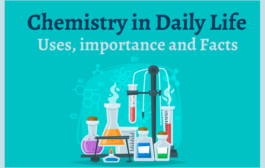Chemistry is a branch of science that is concerned with the study of matter and its properties. It is a vital science that has numerous applications in our daily lives. From the food we eat to the medicines we take, chemistry is present in every aspect of our existence. In this blog, we will discuss the importance, uses, and facts about chemistry in daily life.
Chemistry has been an integral part of our daily lives for as long as we can remember. From applying lotions, cooking food, and washing clothes, to cleaning the house, chemistry is involved in almost everything we do. As a science discipline, chemistry is used extensively in various areas, ranging from the natural processes of photosynthesis to the composition of rocks. This is because chemistry deals with the study of matter and its composition in different components of the universe.
Importance of Chemistry in Daily Life
Food and Agriculture: Chemistry plays an important role in the production, processing, and preservation of food. It is used to develop new fertilizers, pesticides, and herbicides that can improve crop yields and quality. It is also used to create new food products and to enhance the taste and appearance of existing ones.
Medicines and Healthcare: The development of new medicines and treatments is heavily reliant on chemistry. Chemical compounds are used to create drugs that can cure diseases, alleviate pain, and improve overall health. Diagnostic tests and medical imaging techniques such as X-rays and CT scans are also based on chemistry.
Energy Production: Chemistry is crucial in the production and development of energy sources such as fossil fuels, solar cells, and batteries. It is also used in the research and development of new, sustainable energy sources such as hydrogen fuel cells.
Environment: Chemistry is vital in understanding and mitigating environmental problems such as air pollution, water pollution, and climate change. It is used to develop new technologies and materials that can reduce the impact of human activities on the environment.
Uses of Chemistry in Daily Life
Personal Care Products: Many personal care products such as soap, shampoo, and toothpaste are made using chemistry. Chemical compounds are used to create fragrances, colors, and textures that make these products more appealing to consumers.
Cleaning Products: Chemistry is used to create cleaning products such as detergents, bleach, and disinfectants. These products rely on chemical reactions to break down and remove dirt, stains, and germs.
Cooking: Chemistry is used in cooking to create new flavors and textures in food. The Maillard reaction, for example, is a chemical reaction that occurs when proteins and sugars are heated together, creating a delicious brown crust on meat or bread.
Materials: Chemistry is used to create a wide range of materials such as plastics, metals, and textiles. Chemical reactions are used to create new materials with unique properties, such as fire-resistant fabrics or lightweight alloys for airplanes.
Facts about Chemistry in Daily Life
- Chemistry is the study of matter and its properties, as well as the changes it undergoes.
- Every day, we encounter countless chemical reactions, from the digestion of food in our bodies to the combustion of fuel in our cars.
- Many everyday products contain chemicals that can be harmful if not used properly, such as cleaning products and pesticides.
- The use of chemistry in medicine dates back to ancient times, with the use of natural compounds such as opium to relieve pain.
- The development of new technologies and materials based on chemistry has led to significant advancements in fields such as electronics, aerospace, and telecommunications.
In conclusion, chemistry is an essential science that has many applications in our daily lives. From the food we eat, to the products we use, and the energy we consume, chemistry plays a critical role in shaping our world. By understanding and utilizing the principles of chemistry, we can continue to develop new technologies and materials that will benefit society for generations to come.































